It’s a formula that’s been done many times, but thanks to a particular Darkest Dungeon, the game style has reappeared on the scene with a vengeance and new attitude. While walking around PAX East, our team couldn't help but see it everywhere: dungeon-crawlers with Lovecraftian themes, procedurally generated levels, permanent character death, and turn-based combat. They were rising up like the undead hordes you try so hard to defeat in Darkest Dungeon, but often seeming unstoppable.
Naturally, it was easy to shrug our shoulders: "Ah," you could say easily. "See that attack animation? It's just a game clone"! Then we dove deeper. We saw more of what these games were offering, and we realized that many of them are giving a new spin on the genre to give it something unique, adding their own flavor and spin. Rather than being dismissive, we were drawn in, curious to see what might come next for this now popular game style.
In this article, we wanted to take a minute to talk about three that caught our interest; we hope you'll follow along to see what new possibilities are starting to open up in the genre.
Iratus: Lord Of The Dead - Like Darkest Dungeon, But You're The Bad Guy
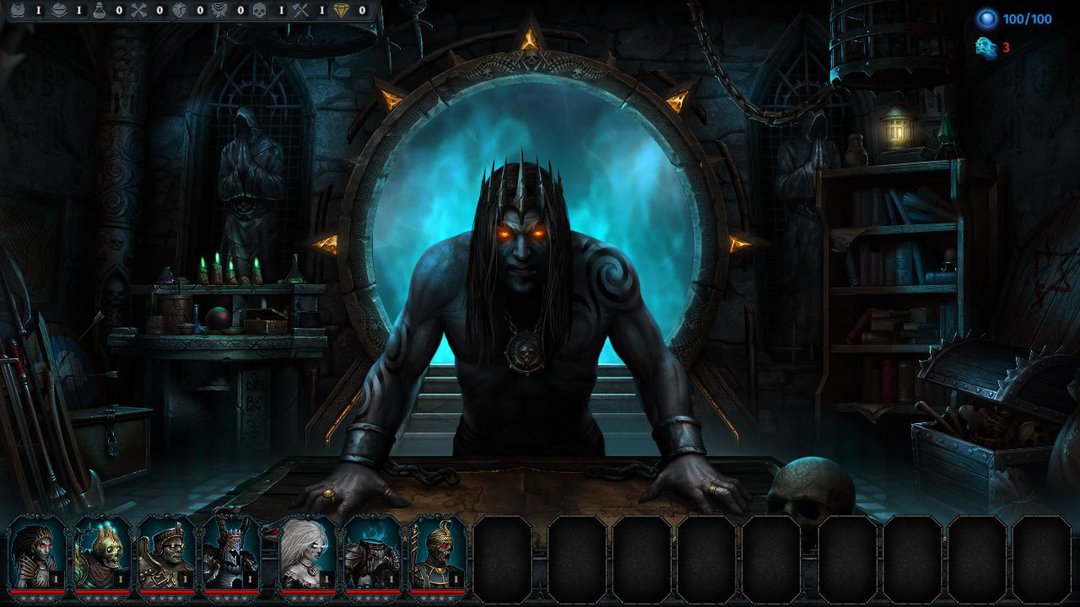
You wouldn't know by looking, but this necromancer has quite a sense of humor.
Iratus takes the formula and inverts it, letting you play as the necromancer Iratus and his undead legion to fight against the heroes who are trying to put him down. It’s a pretty basic switcheroo, but there are some interesting opportunities that come with it. Fortunately, Iratus takes full advantage of them.
A lot of things will look familiar to veterans of Darkest Dungeon or similar games; you start out in a town where you can manage your party and items. You strike out on missions where you have to fight through a series of encounters to reach a final goal, finding various items and events along the way. Even the combat is similar: It features positioning, status effects, to-hit percentages, damage ranges, and sanity meters, so there’s not much new to see here?
Well, except that you’re the one doing the sanity damage. Yes, it’s finally your turn to break your enemies’ minds, and it certainly is fun to watch them descend into madness. Once they’ve taken enough sanity damage, they’ll start berating and even attacking each other, acting irrationally in combat. While it’s not a whole lot of use in normal battles (by the time you drive a basic enemy mad you could probably have just killed it with normal attacks), I can see it being a huge boon against bosses. I didn’t get a chance to test that theory when I played through the demo at PAX East, though, so I’ll have to wait and see.
There are a couple of other twists that come with being the lord of the dead, rather than a mere interloper. For starters,the way you build your party is a bit different. in fact, you literally build your party from the remains of your slain enemies. Using various body parts and a bit of necromantic know-how, you can create anything from basic skeletons and zombies to banshees and shades, and enhance their abilities in various ways.
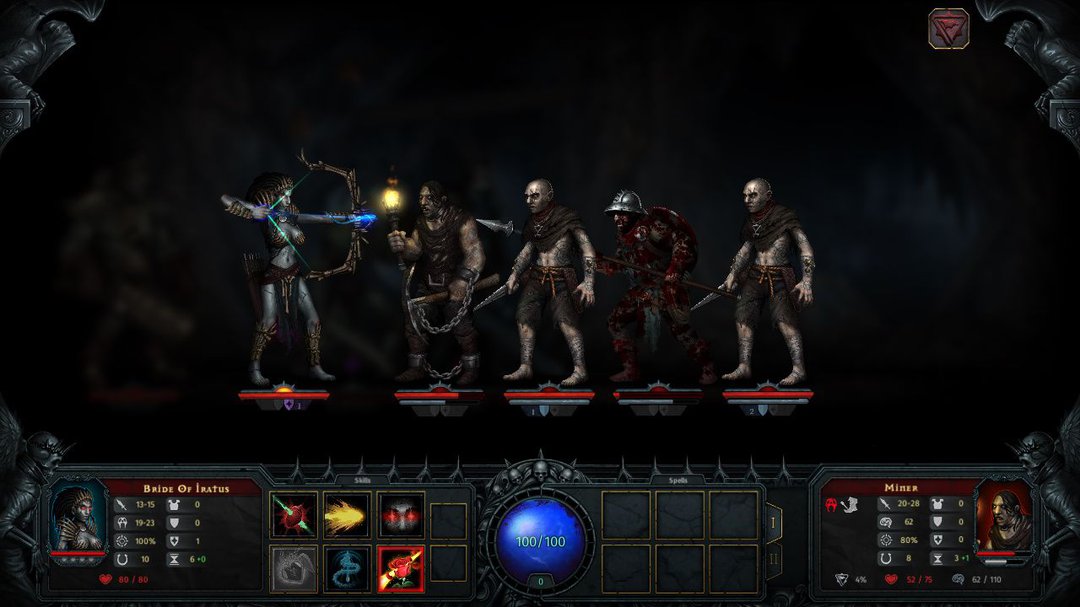
You say people, I say renewable resources. Tomato, To-mah-to!
While Iratus would never deign to get his own hands dirty in a fight, that doesn’t mean that he sits out completely. In addition to building and powering up your minions, you can also give yourself various spells and abilities. Some are passive and do things like buff your party or hinder your enemies, while others are direct attacks to strike down your opponents. The spells at your command add another level both to the RPG elements and the combat, and I think they’re a great addition.
The last major difference you’ll notice is that, when you go into a level, the entire map is already revealed. You are Iratus, after all, and this is your domain. You can already see where enemies, treasures, and everything else are located. The catch is that there are multiple branching paths through the level, and you can’t backtrack. Do you avoid battle as much as possible and focus on collecting items, or do you harvest as many body parts as you can? Is there something you really want, but it’s at the end of an especially difficult route? It lets you plan out your strategy well in advance, but it also constantly dangles the knowledge that you can’t have it all.
Iratus is the debut project of Unfrozen, a studio made up of veteran game devs and based in St. Petersburg, and is being published by Daedalic Entertainment. It’s a great twist on a now-classic formula, and I highly recommend checking it out.
Mistover - Like Darkest Dungeon, But With An Empowered Party
At a glance it certainly seems like Mistover could be another clone. You travel through procedurally-generated levels to engage eldritch monsters in turn-based combat and try to unravel the mystery of where they came from. So, yes, it is a very similar concept, but the execution is completely different.
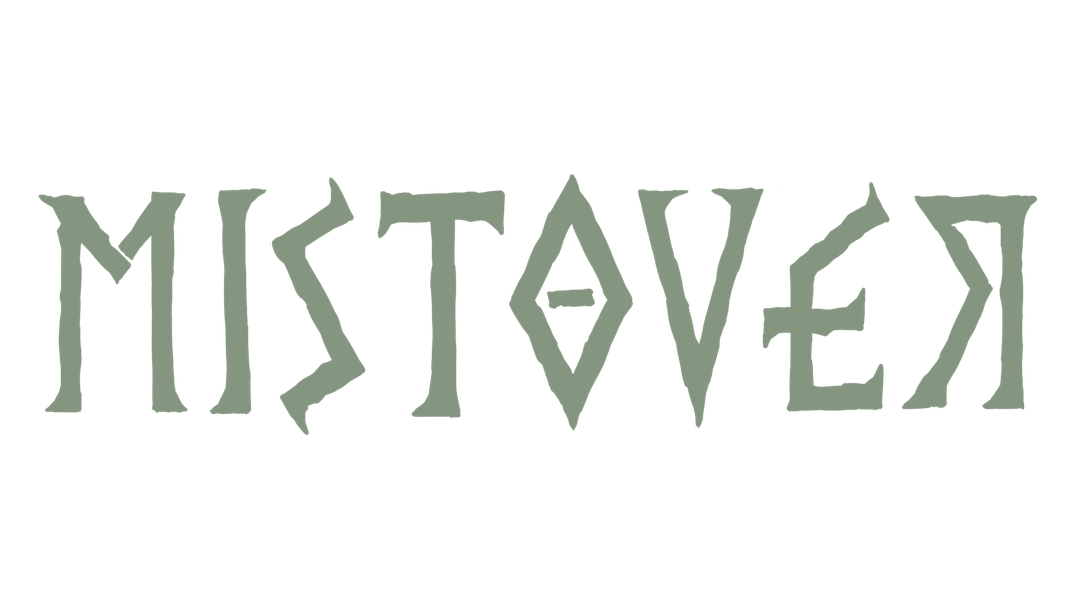
First of all, the systems for navigating the levels outside of combat are much more robust. Mistover goes beyond opening just chests and disarming traps; each class has its own special ability that can be used outside of combat. One class can break obstacles to open up passages or let you reach treasures, for example, while another makes you invisible to monsters for a few turns so that you can escape or get the drop on them. One heals your party over time, and one even freezes time for a few rounds, letting you act with impunity until the effect wears off.
I was pleasantly surprised at how many options I had while exploring the demo level. At one point I had a monster chasing me and I was backed into a corner. I was told that if the monster started the fight (by running into me) I’d be at a pretty significant disadvantage, but that I had a couple of ways to get out of it. I opted to use my ranger’s ability to hide from monsters and slip away to keep exploring. Later, I used my time stop effect to walk right up behind a monster and take the advantage in the battle.
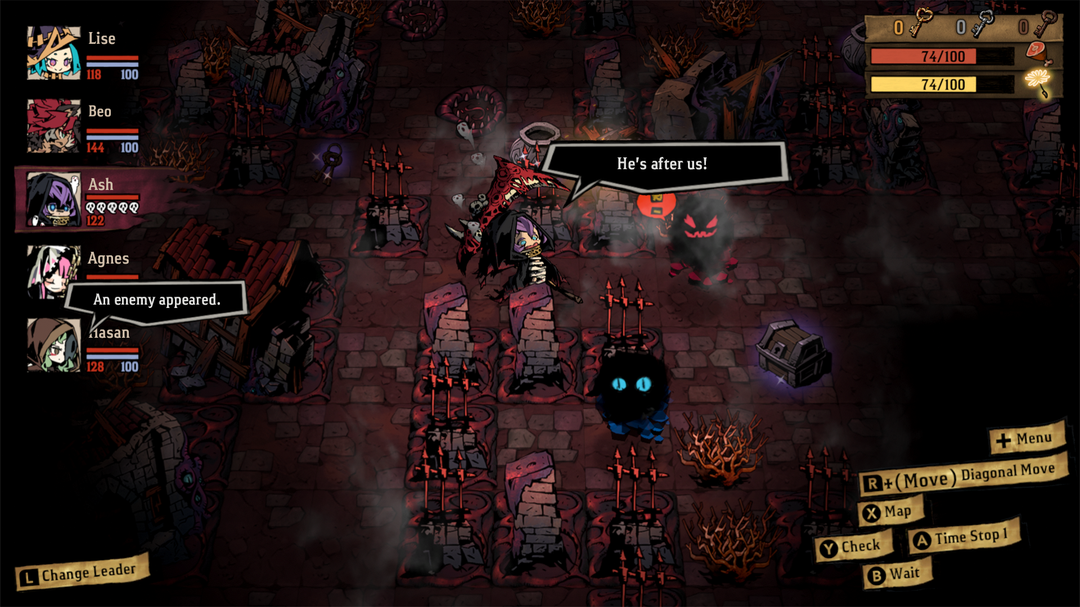
If you must fight, make sure to fight on your terms. Ala Chronotrigger, you have a chance to be ready when combat comes.
The combat, too, is more of an evolution of Darkest Dungeon than a copy of it. Instead of a simple line of four characters, you instead position your party on a 3x3 grid - think Mega Man Battle Network. The positioning is extremely important, and becomes more complicated than you'd expect. You don't just need to have your combatants in places where they can use their attacks; to really use their full potential, you need to set up combo attacks with by having certain character classes next to each other. Between this and the overworld abilities there are a lot of decisions to be made when putting a party together, and it feels good to have that control.
However, the actual combat will again feel pretty familiar. It’s the same turn-based system of looking at chance to hit and damage dealt, weighing your options, and trying to kill the enemies before they kill you. That’s not necessarily a bad thing though - the system works, and Mistover has enough other things going on that a bit of familiarity in the combat helps to keep it comfortable. While the game certainly has dark overtones in its art and mood, the game itself isn't quite as soul-crushing.
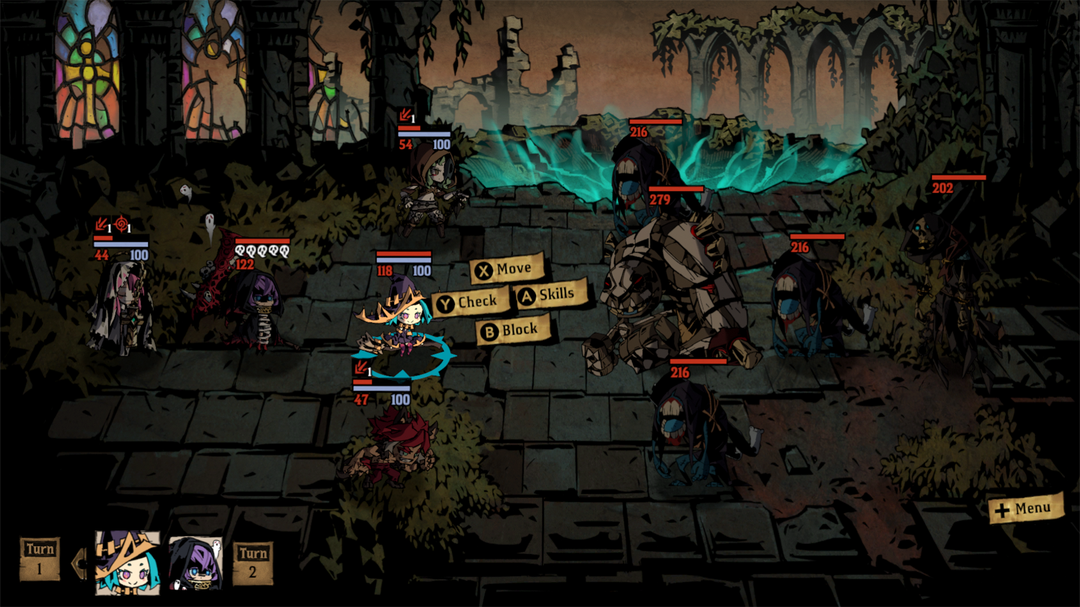
Up? Down? What are these things? New options await you.
Mistover is being developed and published by Krafton Game Union, a company located in South Korea, lending to it a different style and feel than we're used to seeing. It is coming to Steam and the Nintendo Switch, but the release date has not yet been announced. If you were a fan of Darkest Dungeon but are looking for something that builds on the formula to become something completely different, I definitely recommend keeping an eye on this one.
Warsaw - Like Darkest Dungeon, But The Evil Is Real
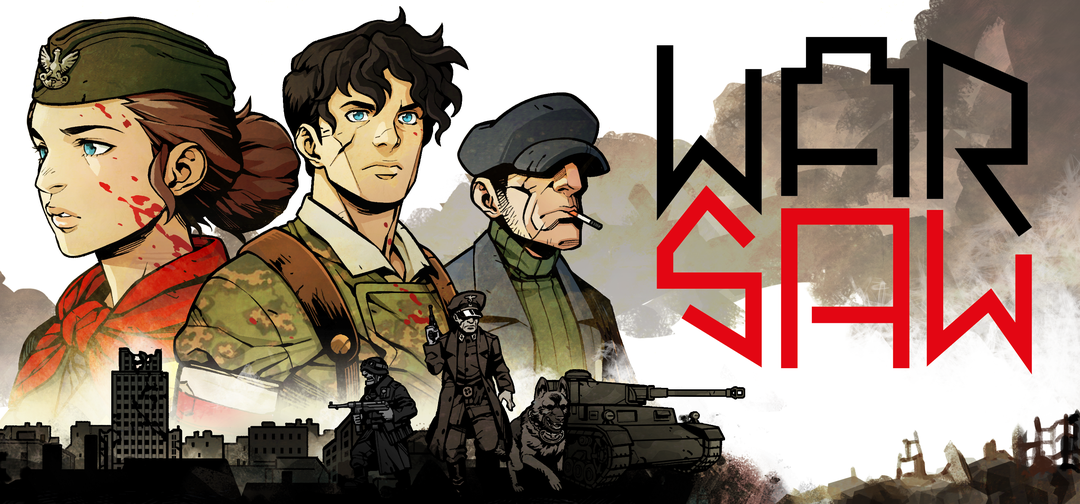
Warsaw made a splash a few months ago with a fantastic animated trailer, promising an atmosphere and intensity that can only be found in games like This War Is Mine. Unfortunately, it didn't take long for people to start drawing comparisons between Warsaw and Darkest Dungeon due to a few ways characters were animated in combat. Wyatt had a chance to play this game at PAX East, and we were happy to have the chance. Now, we can safely say that anyone who tries to be dismissive about this game just because of genre similarities is going to be missing out on one hell of an experience.
Our ears still ring with one revelation we recieved while at the Warsaw booth: that this is a game which is not alternative history. If that admission doesn't make your blood run cold, it should; The Warsaw Uprising was one of the most tragic events that occured during World War II. The bitter, nihilistic narration that you experience in Darkest Dungeon, as good as it is, simply cannot hold a candle to the creeping sense of dread that you'll have to experience playing through Warsaw. While our time playing the game on the show floor was only at the start of the campaign, already knowing how certain events play out gives it a sense of unease that feels almost impossible to describe.
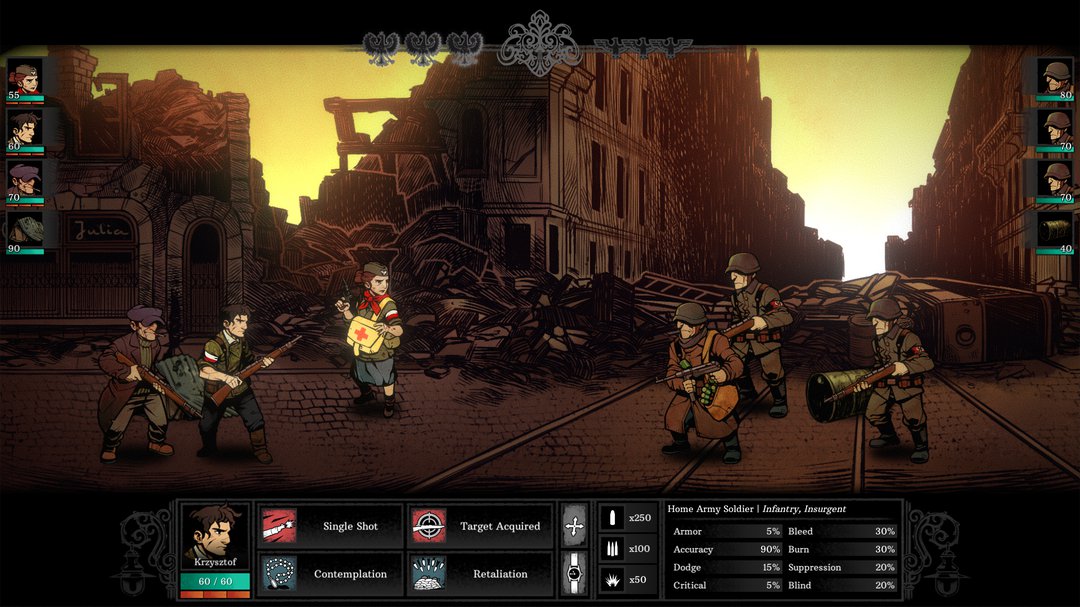
All of this shouldn't take away from how the gameplay is. It's tense and tactical; while the zoom-in close ups when characters are attack or get hit will look very familiar, there's more than enough to make this game its own. Like Mistover, Warsaw plays on a grid, although this one is 6x2, where portions of each side's grid will have cover strewn about them. Running from side to side, from cover to cover, helps simulate having to advance or retreat through the terrible conditions of city fighting. While there are some surface similarities, its safe to say that the theme, tone, and gameplay all blend together to create an immersive experience all its own.
Talking with the developers was a humbling experience while trying out Warsaw. Their motivation for making this game, for trying to make a statement about the real horrors that can occur in this world without the help of eldritch abominations is moving. It would be a tragedy to let internet talk mark this game as just a clone, when the experience it will offer in Fall 2019 can be so much more.
Evolution Is Different Than Imitation
In a lot of ways, writing this article felt not just good, but validating. It proved to us here that while many can claim the games industry is filled with clones, that there's a whole new generation of games in this genre alone that show innovation isn't dead. Far from it, games like Iratus, Mistover, and Warsaw show how developers can take something iconic and add a new voice to the conversation. Each of these games does something interesting and new, letting gamers explore new territory while still relying on something that feels familiar. It's a delicate balance that developers have to walk: how much time they should spend re-inventing the wheel.
In our minds, these games each have tried for that sweet spot, and succeeded in their own ways. It's going to be a good 2019 as all three hit the market, and we can't wait for the challenge each one will bring.